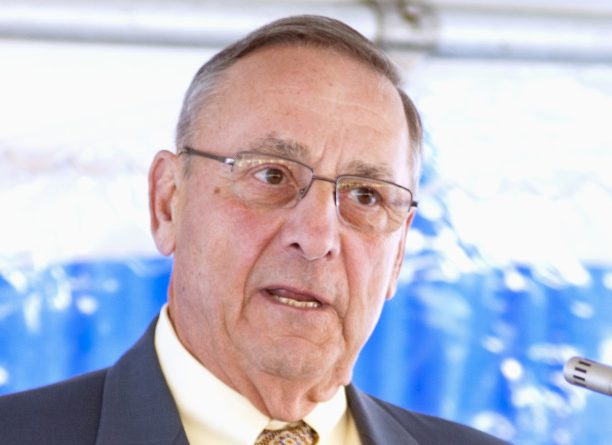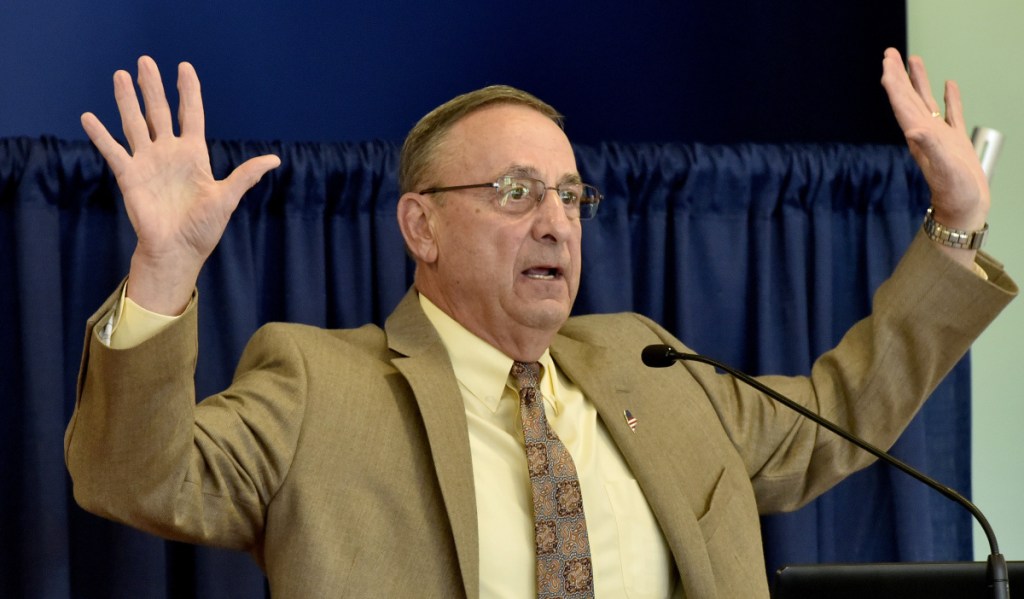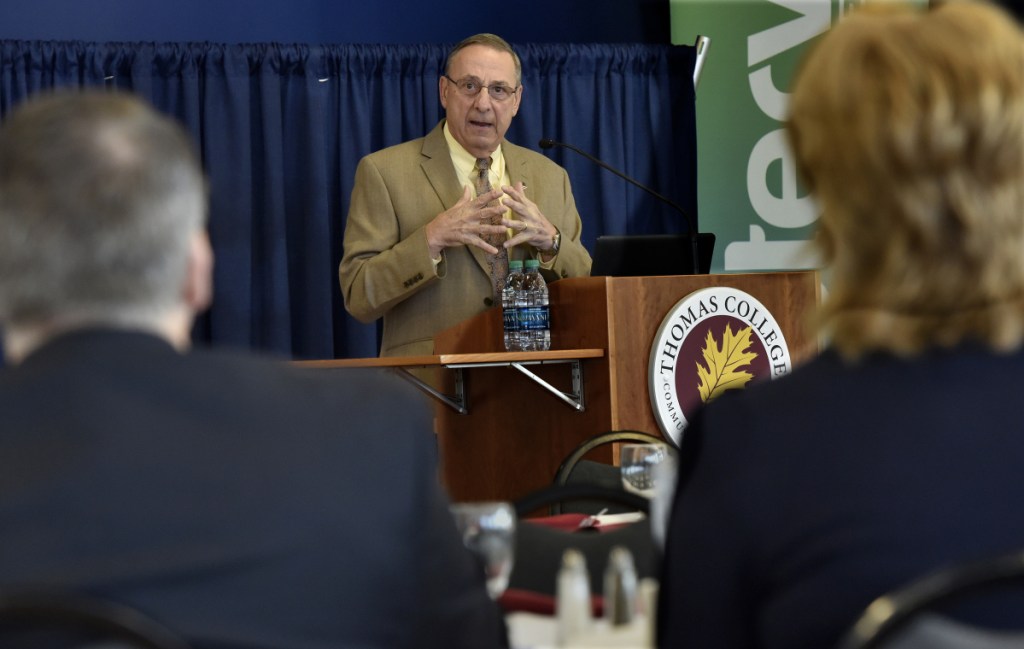WATERVILLE — Gov. Paul LePage on Thursday disputed a claim from a member of the Mid-Maine Chamber of Commerce that hospitals in Maine are struggling, saying they have $800 million worth of projects planned in Bangor, Portland and other areas.
“The investment in Augusta has proved to be a massive disaster. They’re the highest cost hospital in Maine,” LePage said in reference to MaineGeneral Medical Center, as part of wide-ranging comments to a few dozen people at a chamber business breakfast at Thomas College.
LePage, whose talk was billed as an overview of his planned legislative agenda from now until the end of his term, also spoke about the state’s high property taxes and said a six-month study to identify why property taxes are so high in Maine was just completed, and while many think the reason is education, it is actually because of so much property having been taken off the tax rolls — a total of $18 billion in the last two years. The most valuable land in Maine, including that which is along the coast and property placed in conservation, is not taxed, he said.
“It’s just sinful. … The rest of us have to pay. We have to double down and pay all the taxes,” he said, adding that if everyone paid his share, the state could lower the tax rate by 25 percent.
LePage said that 20 years ago there were 35,000 acres in conservation, and today there are more than 500,000 acres in conservation.
Some of the largest landowners are hospitals, and they are one of the largest users of public services, according to LePage. Colleges, universities and police departments also are large users of public services, he said.
“Colby (College)’s assessed value is higher than the entire city of Waterville — the same with Bowdoin and Bates,” he said. “The rest of the people in Waterville have to pay for the taxes that are not being paid by Thomas, the hospitals, Colby, Kennebec Valley Community College.”
Waterville has hospitals, colleges, dozens of churches and 108 nonprofit organizations doing business in Waterville, according to LePage, who said conservation properties and other entities being tax-exempt “really hurts the majority.”
Don Plourde, a real estate broker and co-owner of Coldwell Banker Real Estate, responded to LePage’s comments about hospitals, saying they are “all kind of struggling.”
“Don’t buy that,” LePage said. “Let me tell you this. When I took over, the state of Maine owed hospitals $750 million. We paid them off.”
The federal government, he said, put in $50 million. Hospital construction on the planning board now totals $800 million and smaller hospitals are struggling because “we have a certificate of need controlled by Bangor and Portland.”
The Bangor hospital’s certificate of need totals $250 million, Portland’s is $500 million, and smaller hospitals $50 million, according to LePage.
He said when he was mayor of Waterville he argued against building the hospital in Augusta.
“It is proving out to be a very costly investment,” he said.
Chuck Hays, president and chief executive officer of MaineGeneral, responded later Thursday to LePage’s claim in the following statement emailed to the Morning Sentinel:
“MaineGeneral’s vision is to be the leading community health care system in Maine, recognized for clinical excellence, customer satisfaction, financial stability and impact on community health. As part of that vision, we are transparent with our patients about costs. Based on the cost data, MaineGeneral’s costs are not high but are in the middle range of charges, and we work hard to set fair and equitable rates for our services.”
“As part of our non-profit commitment we provide services to those who cannot afford to pay for those services. In 2016 our charity care expenses were $12.6 million and bad debt expenses were $33.8 million. In addition, hospitals do pay a tax to the state, and MaineGeneral paid $1.2 million to the state in 2018.”
“The new hospital has been a great success for patients, visitors, staff and our community. Our quality and patient experience scores are the highest they have ever been and some of the highest in the state for large hospitals. Our staff provides excellence at work and they live and work right here in our communities to serve our neighbors.
“Maine hospitals are facing a number of serious financial challenges. As the reductions in both Medicaid and Medicare continue, services and access will be at risk across the state.”
Hays pointed to a report from the Maine Hospital Association, “Taking the Financial Pulse of Maine Hospitals: An Overview,” which he says details some of those challenges.
Meanwhile, LePage said he just sold his home in Florida, where his taxes were $2,000 a year, and taxes on his property in Boothbay are $4,000.
“I’m selling that house, too,” he said. “Maine is a very, very highly taxed state.”
New Hampshire has the No. 1 per capita income in the U.S., with a $74,000 median income, but Maine is roughly in the low $40,000s, he said, adding, “It need not be that way.”
New Hampshire has no income or sales tax and Maine has one of the highest income taxes in the country, LePage said.
Maine is in the best shape it has been in 50 years; it has money in the bank and expects the rainy day fund will hit $250 million this year, according to LePage.
“The state’s in really good shape,” he said. “I just hope the next governor continues with the progress.”
There are still things he wants to get done in his last year, including funding Medicaid reform, but the Legislature won’t appropriate the money necessary to expand, he said, calling it “shameful” and urging chamber members to call legislators to ask them to fix the problem.
“The Democratically controlled House will not give me the money to implement Medicaid expansion,” he said. “It’s the law and they will not fund it.”
There are people who have abused the system and people who truly deserve the funding, he said.
“That’s one thing that I think the people of Maine should really speak out about because we voted for it, it is the law and let’s do it.”
LePage also said if the state conforms to the federal tax code and does nothing else, the people of Maine will pay $275 million in added income tax. He is proposing to the Legislature that the state conform but also give $225 million back to Mainers over the next three years, he said.
“I really urge you to encourage your elected officials to push for conformity,” he said, adding that he thinks it is good for Maine, the economy and jobs.
He said six companies will be coming to Maine — including two in the fishing industry and one that produces cross-laminated timber.
Maine has a negative birth rate — more people are dying than being born, presenting a big problem, according to LePage, who said the situation represents a “real crisis.”
Last weekend, he said, the state lost 10 people to the opioid epidemic.
LePage this year is proposing to fund a student debt program to give students interest-free loans to help attract young people to Maine, he said. The state would pay the interest on the loans and give a business that hires the young person a dollar-for-dollar reduction in taxes for every student loan paid off, he said.
In that way, a student gets free education and an employer gets a new hire and helps pay off the student debt, he said.
“We lower the median age of Mainers, so over the long term, everybody wins,” he said. “The state wins because we lower our income taxes.”
A Republican, LePage said the problem with the bill is that the Democrats agree with him on it, but Republicans don’t want to do it. His comment drew laughter.
The one thing he said he wishes he had been able to do during his tenure is reduce energy costs, adding that the state needs to be assertive on that front. He said he is interested in hydrogen technology, which has been developed at the space center in Florida. Ocean water, he said, can be used to heat homes, and the idea is promising.
“It is amazing, this technology. What they’ve done is amazing.”
Amy Calder — 861-9247
Twitter: @AmyCalder17
Send questions/comments to the editors.






Comments are no longer available on this story